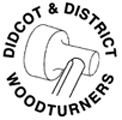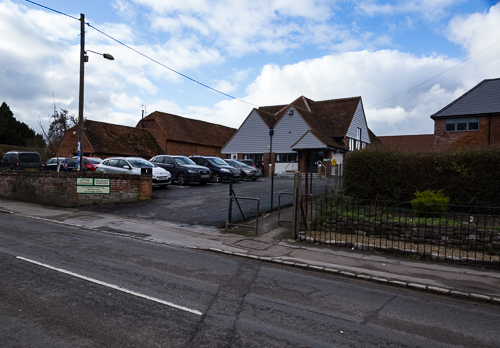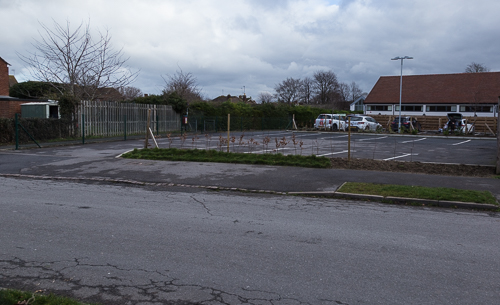

We meet in Harwell Village Hall (OX11 0EX) about 2.5 miles from central Didcot.
The village hall is on Harwell High Street, on the right towards the further end if you are coming from Didcot.
There is a small car park at the front of the hall ( where you will probably see a Fish & Chips van on club night ) and a larger one at the rear of the hall which is accessed from 'Westfield'. If coming from Didcot carry on along the High St, past the hall and follow the road around a sharp right bend and then take the first right into 'Westfield'. If coming from Wantage or Reading take the Wantage Road into Harwell and turn left into 'Westfield' as the road bends to the right. The car park is on the right.
Most of our meetings are what we call 'Hands On'. The club owns several lathes, which get used on a club Practical Evening.
Some of the lathes are used for some of the time by the experienced turners to show / teach beginners how to turn different shapes or items and there is one particular item chosen for each month to demonstrate or practice the various skills needed to make it.
Other lathes might be used for some of the time by beginners perfecting their skills or trying out new methods or tools.
If you have a project you would like to try or a technique that you would like to learn, bring it, or your work in progress, along to a hands on evening. You will always find one of the more experience turners willing to give you a hand.
The club also owns a few sets of turning tools and some safety equipment but there will never be enough and if you have your own tools and safety gear we encourage you to bring them.
On three evenings a year we arrange demonstrations from well known professional turners, some working architectural turners, some art turners, both of which are always popular.
We have, in the recent past, hosted all day demonstrations, usually on a Sunday, and could do again if there is enough interest but they do cost more and need to be arranged well in advance.
It is all very relaxed with a warm and friendly camaraderie but we must remember that although wood turning is regarded as one of the safest forms of woodworking it can still be dangerous and safety must always be at the forefront. The club has a few pairs of safety glasses and face shields but experienced members are expected to bring their own.
All members must read and agree to the clubs risk assessment before any equipment is used.
The equation is simple. Sharp tools use less energy to cut and wood turners should never need to use any degree of brute force.
Most new turners are worried about their ability to put an edge on their new tools and keep them sharp. It is not a dark art but it can be difficult to learn alone. Like most things in life it is easier when shown.
The club owns a sharpening system for the club tools ( and yours ) which will be available during ‘hands on’ meeting. We use a grinder and positioning jig as favoured by most turners and sometimes bring along the very popular Sorby ProEdge system which many find easier to use. New turners are welcome to watch, learn, try, and help.

View of Harwell village hall from the High Street

View of rear carpark for Harwell village hall in 'Westfield'
When you first come along we will treat you as a non-paying guest for the first two meetings.
Membership cost is £20.00 per year ( or pro-rata for first year ) for adults and £10.00 per year for younger people still in full time education. The clubs membership year is October to September.
There is also a charge of £4.00 per meeting attended ( £2.00 for the young ) payable at the door...... we will probably try to sell you some raffle tickets as well.
We will provide you with free tea/coffee and biscuits.
That is the question that most new turners ask. One answer is here on a club night!!
Whenever possible we try and have some suitable timber available at the Harwell Hall on a club night.
One local source might be Oxford Wood Recycling in Abingdon. As well as all forms of recycled timber for any DIY projects, they also hold hard wood turning blanks.
Other sources are Axminster Stores, though they only hold a limited stock and it tends to be relatively expensive.
Yandles at Marston in Somerset hold an enormous stock, but it is quite a trip.
And you will find woodturning blanks on Ebay, but you 'pays your money and takes your chance'.
And its not only wood we can turn. Acrylics and soft metals such as pewter and copper can also be used.
You should be aware of the difference between the different types of wood and the condition of the wood.
Generally we turn hard woods. These may be native UK species such as Sycamore, Beech, Oak and various fruit woods, or exotic species such as Sapele, Padauk and Zebrano. Softwoods such as pine and spruce are coarse grained and thus it is difficlt to get a clean finish, but they are useful for practice.
In terms of condition wood can be 'wet', 'dry' or 'spalted'. When wood is first cut down the wood is "wet", that is it is still full of sap. It will be easier to turn but liable to crack as it dries. Wood can be air dried or kiln dried. If air drying allow approx one year for each inch of thickness.
Spalted wood has begun to rot. This can create some attractive figuring, but the wood can necome 'punky' and difficult to work.